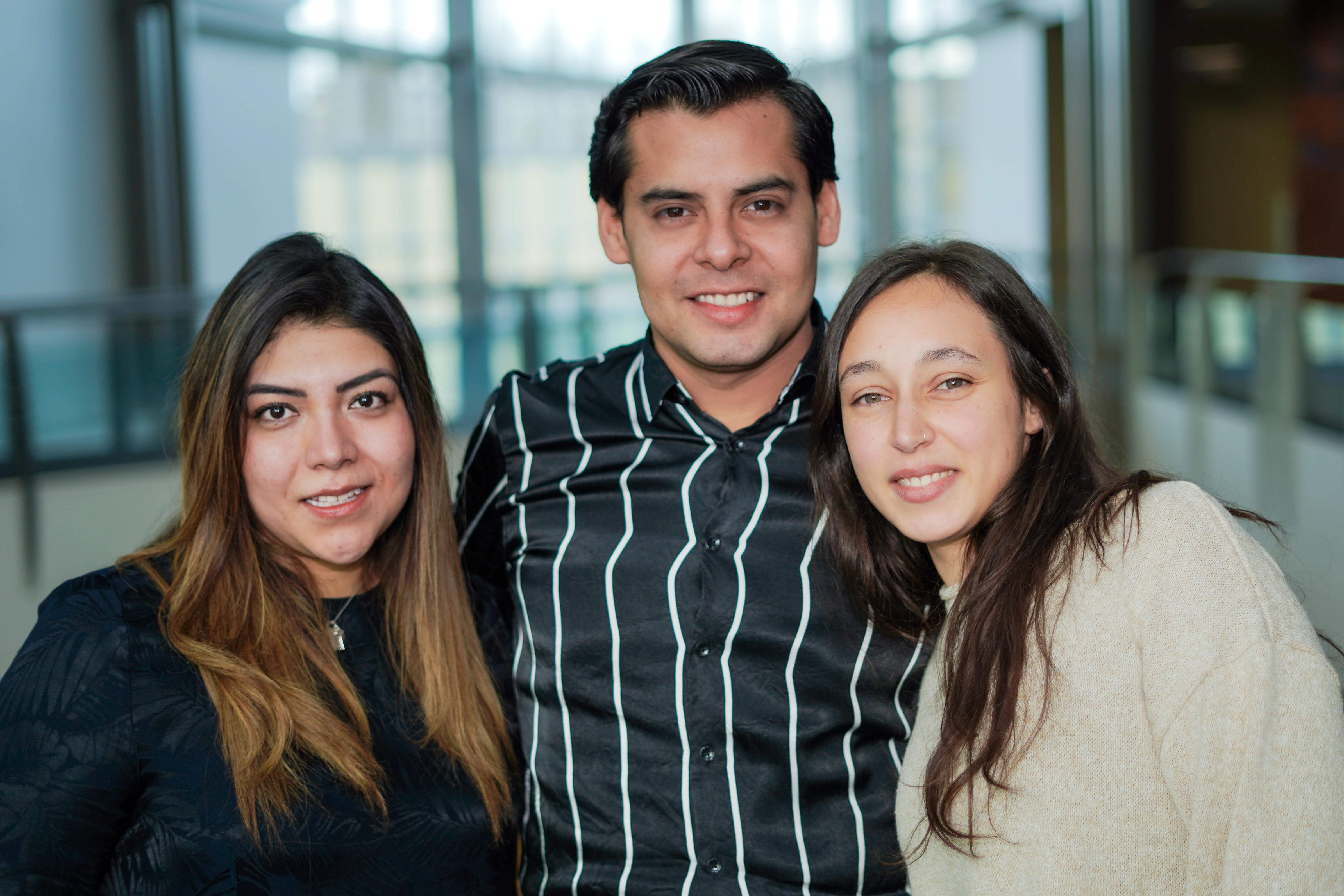
Left to right: Ariadna Ivonne Rincon Mendez, Carlo Azuara, and Carla Germani
Graduate school was the furthest thing from Carla Germani's mind. She was working for Chile's Ministry of Environment, trying to solve pollution issues being faced by the country. As she puts it, Chile is a country whose pollution is impossible to measure because there aren't any set environmental standards.
"There are a lot of big environmental issues and many people are getting really sick," says Germani. "We are dealing with land contamination from toxic waste and mining, water contamination from fertilizers and the continual challenges from climate change."
It was through her work at the Ministry of Environment that she learned about the Canadian-Pacific Alliance Scholarship Program (CPASP), funded through Global Affairs Canada. This program sees universities all across Canada offering short courses, certificates and professional master's degree scholarships to government employees in the Pacific Alliance countries: Chile, Mexico, Peru and Colombia. Today, Germani is studying for her master's degree at UAlberta in Agronomy with a focus on land reclamation.
The aim of CPASP is to foster a greater exchange of ideas between Canada and the Pacific Alliance countries, ultimately helping these public sector employees instill new and progressive ideas into their work. Global Affairs Canada is granting $5 million over five years with the aim of providing opportunities to at least 120 public sector employees in the PA countries to engage in Canadian education and training, including online course work in gender equality and human rights.
All recipients of CPASP funding are public servants whose work relates to extractive industries, such as mining and petroleum, with a lot of the focus in the actual course work being around capacity building for the public institutions and sustainability for their practices. This September saw UAlberta's first set of students under CPASP start their studies. In total, the university accepted three Master's students and eight short-course trainees.
"CPASP is a full scholarship, which is rare as a professional development opportunity," says Milena McWatt, Program Manager for CPASP with UAlberta International. She explains that studies pertaining to technical, social, environmental, and legal or policy topics related to mining and petroleum are all eligible for CPASP funding. "CPASP award holders will also get to build their leadership skills as ambassadors when they return to their home countries and share what they have learned with their colleagues."
Carlo Azuara is an engineer from Mexico City working with Pemex, the state-owned petroleum company in Mexico and the largest employer in the country. He arrived at UAlberta to earn his Master's degree in Integrated Petroleum Geosciences, which he sees as a way to enhance his knowledge and skills so that he will be able to contribute to the improvement of oil exploration tactics used by Pemex, as well as to the overall development of the company and of the whole country.
"UAlberta is offering the biggest and most complete program in Geophysics and the most applicable course work to my career in petroleum," says Azuara. "Alberta is the most important province in terms of petroleum and the professors here all know the industry really well. There is so much I can learn here and bring back to Mexico."
In addition to benefiting public employees in Pacific Alliance countries, CPASP also positions UAlberta as a leader among Canadian universities in responding to capacity building and sustainability needs expressed by partners and clients across the globe. Showcasing the expertise throughout the consortium of universities participating in CPASP means UAlberta can foster greater collaboration and connect more government employees with some of the best study and training opportunities Canada has to offer.
Over the next year, more trainees will attend courses on social conflict, environmental assessment, community-based decision making, emergency management, environmental economics, land reclamation, mining governance, and many more topics.
"I'm already applying the knowledge I'm accumulating here by sharing the most recent published articles in this field with my colleagues in Mexico," says Ariadna Rincón Méndez, who's studying for her Master's degree in Agronomy with a focus on resource economics and environmental sociology. She explains that her goal with her studies is to bring back to Mexico a better foundational knowledge to enrich the decision making in public policy. She sees great importance in creating connections and linking stakeholders when it comes to environmental politics.
"I am certain this program will impact more than a student's life. It's enhancing and strengthening the public capacities of Latin American countries. The professors here have a great commitment to rigorous research, not only in matters of science but with the highest ethical standards."
Rincón Méndez's sentiment is echoed by her fellow CPASP students. Germani explains that the draw to UAlberta went far beyond the course work offered. It was the institution's global reputation that drew Germani, and her on-campus experience has already proved to be one of the most promising ventures in her career.
"The labs are world-class, the professors are world-class and the students are incredibly open-minded," says Germani. "This is a top school in the world and I am excited for the opportunities to share new ideas and research."